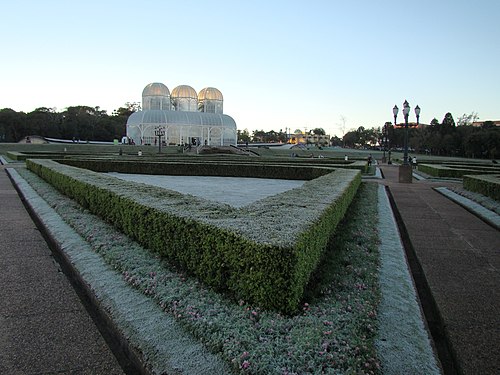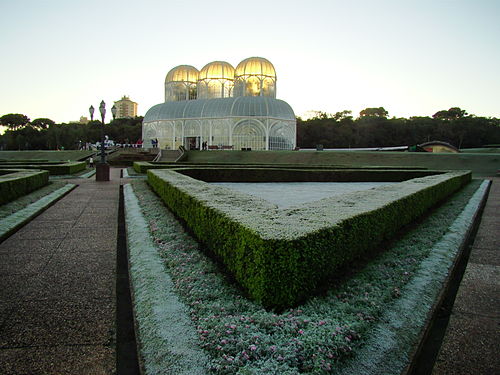Dewnoun
(uncountable) Any moisture from the atmosphere condensed by cool bodies upon their surfaces.
Dewnoun
(uncountable) Moisture in the air that settles on plants, etc in the morning, resulting in drops.
Dewnoun
An instance of such moisture settling on plants, etc.
Dewnoun
(figurative) Anything that falls lightly and in a refreshing manner.
Dewnoun
(figurative) An emblem of morning, or fresh vigour.
Dewverb
To wet with, or as if with, dew; to moisten.
Dewnoun
Moisture from the atmosphere condensed by cool bodies upon their surfaces, particularly at night.
Dewnoun
Figuratively, anything which falls lightly and in a refreshing manner.
Dewnoun
An emblem of morning, or fresh vigor.
Dewverb
To wet with dew or as with dew; to bedew; to moisten; as with dew.
Dewadjective
Same as Due, or Duty.
Dewnoun
water that has condensed on a cool surface overnight from water vapor in the air;
Dew
Dew is water in the form of droplets that appears on thin, exposed objects in the morning or evening due to condensation. As the exposed surface cools by radiating its heat, atmospheric moisture condenses at a rate greater than that at which it can evaporate, resulting in the formation of water droplets.When temperatures are low enough, dew takes the form of ice; this form is called frost.
Frostnoun
A cover of minute ice crystals on objects that are exposed to the air. Frost is formed by the same process as dew, except that the temperature of the frosted object is below freezing.
Frostnoun
The cold weather that causes these ice crystals to form.
Frostnoun
(figurative) Coldness or insensibility; severity or rigidity of character.
Frostnoun
(obsolete) The act of freezing; the congelation of water or other liquid.
Frostnoun
A shade of white, like that of frost.
Frostnoun
A disappointment; a cheat.
Frostverb
(transitive) To cover with frost.
Frostverb
(intransitive) To become covered with frost.
Frostverb
(transitive) To coat (something, e.g. a cake) with icing to resemble frost.
Frostverb
(transitive) To anger or annoy.
Frostverb
(transitive) To sharpen (the points of a horse's shoe) to prevent it from slipping on ice.
Frostnoun
The act of freezing; - applied chiefly to the congelation of water; congelation of fluids.
Frostnoun
The state or temperature of the air which occasions congelation, or the freezing of water; severe cold or freezing weather.
Frostnoun
Frozen dew; - called also hoarfrost or white frost.
Frostnoun
Coldness or insensibility; severity or rigidity of character.
Frostverb
To injure by frost; to freeze, as plants.
Frostverb
To cover with hoarfrost; to produce a surface resembling frost upon, as upon cake, metals, or glass; as, glass may be frosted by exposure to hydrofluoric acid.
Frostverb
To roughen or sharpen, as the nail heads or calks of horseshoes, so as to fit them for frosty weather.
Frostnoun
ice crystals forming a white deposit (especially on objects outside)
Frostnoun
weather cold enough to cause freezing
Frostnoun
the formation of frost or ice on a surface
Frostnoun
United States poet famous for his lyrical poems on country life in New England (1874-1963)
Frostverb
decorate with frosting;
Frostverb
provide with a rough or speckled surface or appearance;
Frostverb
cover with frost;
Frostverb
damage by frost;
Frostnoun
a deposit of small white ice crystals formed on the ground or other surfaces when the temperature falls below freezing
Frostnoun
a weather condition or period of cold weather in which deposits of frost form
Frostnoun
a person's cold or unfriendly manner
Frostnoun
a failure
Frostverb
cover (something) with or as if with frost; freeze
Frostverb
become covered with small ice crystals
Frostverb
damage or otherwise affect as a result of frost.
Frostverb
decorate (a cake or biscuit) with icing
Frost
Frost is a thin layer of ice on a solid surface, which forms from water vapor in an above-freezing atmosphere coming in contact with a solid surface whose temperature is below freezing, and resulting in a phase change from water vapor (a gas) to ice (a solid) as the water vapor reaches the freezing point. In temperate climates, it most commonly appears on surfaces near the ground as fragile white crystals; in cold climates, it occurs in a greater variety of forms.

































